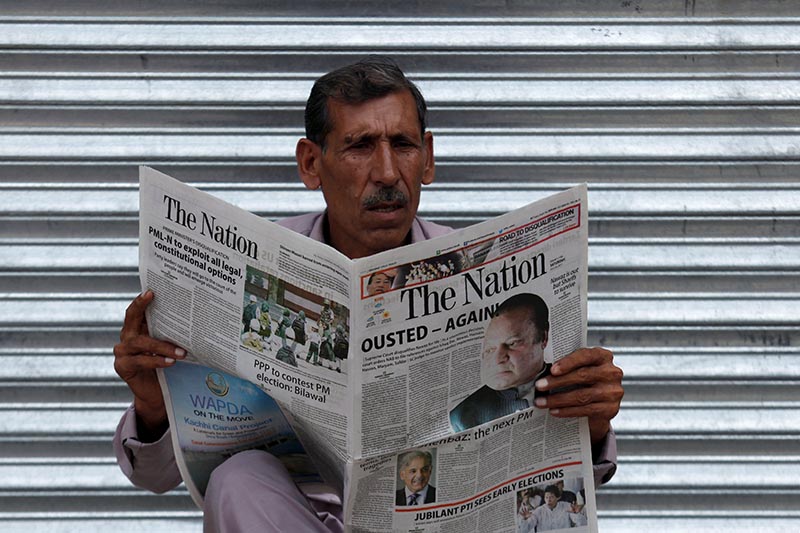Brother of ousted Pakistani PM seen as successor
ISLAMABAD: Pakistan's ruling party plans to appoint the brother of ousted Prime Minister Nawaz Sharif as his successor to fight the 2018 general elections, local media reported on Saturday, but will first have to appoint an interim prime minister.
Shahbaz Sharif, 65, the chief minister of the vast Punjab province that accounts for more than half of Pakistan's 190 million people, will need to be first elected to the national assembly before he can take over as leader of the country.
Nawaz Sharif's resignation on Friday has plunged the nuclear-armed nation into political turmoil after several years of relative stability. Sharif quit after he was disqualified by the Supreme Court over undeclared assets.
The court has also ordered a criminal investigation into Sharif, 67, and his family.
Sharif has always denied any wrongdoing and his toppling has rekindled concerns about Pakistan's democracy after a member of his Pakistan Muslim League-Nawaz (PML-N) party hinted that elements of the powerful military were in some way involved.
"We know very well what the crime of Nawaz Sharif and the Muslim League is. What do we ask for? We ask for civilian supremacy in Pakistan," Railways Minister Khawaja Saad Rafiq told a news briefing.
Questioned further, however, Rafiq would not name the military as a whole.
The army has not commented on Sharif's removal, or allegations they were involved. In the past the army has dismissed claims they are behind Supreme Court's push against Sharif.
Sharif's PML-N party is due to meet on Saturday and will likely appoint a short-term leader to fill the vacuum until Sharif's younger brother becomes an elected lawmaker, according to the English-language News and Dawn newspapers.
"This decision was taken here at the PM House on Friday," the News reported on Saturday.
Among possible allies to replace Sharif in the short term are members of his outgoing cabinet including Defence Minister Asif Khawaja, Planning Minister Ahsan Iqbal and Petroleum Minister Shahid Abbasi.
If elected, the interim leader would be in power for at least 45 days until Shahbaz steps down as the head of the Punjab government, and contests a by-election to the national assembly.
Rafiq, the railways minister, told Geo TV late on Friday that it was not yet decided if the interim leader would be in power for a 45-day period or until the next general election, which have to held by early August 2018.
Whoever replaces Sharif will have to tackle Pakistan's worsening ties with the United States, frayed relations with India, and persistent attacks by Islamist militants including the Pakistani Taliban and Islamic State.
The state of the economy - which is growing at its fastest pace in a decade - has also began to concern economists, who are warning an over-valued currency is hurting exports and urge action over a ballooning current account deficit.
Shahbaz Sharif has been in charge of Punjab since 2008, building a reputation as a competent administrator focused on building infrastructure. He also has better relations with the military than his brother.
The opposition has hailed the Supreme Court's decision to remove Nawaz Sharif as a sign of progress and greater accountability in a nation where impunity is rife.
"They have given Pakistan hope. This is what everyone is celebrating," Imran Khan, cricketer-turned-politician who leads the opposition PTI party, said on Friday.
Khan's PTI party plans to hold a victory rally on Sunday.
"JUDICIAL COUP"
Nawaz Sharif, who has served three separate stints as prime minister, has not commented on the Supreme Court verdict against him but his party said it had "serious reservations" about the judicial process.
Sharif was investigated for corruption after the "Panama Papers" data leak revealed his family used offshore companies to buy posh London apartments.
But his ouster was down to the little-used Article 62 of the Constitution, which allows for dismissal from office of anyone deemed dishonest. The Supreme Court enacted the law because Sharif's failed to declare monthly income, equal to $2,722, from a Dubai-based company his son owned in disclosure papers filed for the 2013 elections his party won.
Sharif's allies have privately spoken of a "judicial coup" and say every parliamentarian would likely fail the Article 62 test, including opposition leader Khan, who also has a pending Supreme Court case against him over undeclared income.
The involvement of two members from military intelligence agencies as part of a six-man Supreme Court-appointed investigative panel probing Sharif had further stoked fears within PML-N that the powerful generals had a hand in the judicial proceedings.
Sharif's two previous stints in power were also cut short, including by a military coup in 1999, but he returned from exile to win a resounding victory in general elections in 2013.
No prime minister has completed a full term since independence from British colonial rule in 1947.
READ ALSO






